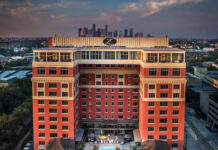 Although the number of female chief financial officers is on the rise at major corporations—up 35 percent in 2013—men still account for 90 percent of these high-paying, leadership roles. But Debra Bates knows the job well. She earned her first CFO appointment at a Houston-based real estate company in her 20s and launched her own real estate consulting firm shortly after. As CFO at Dolce Hotels and Resorts, a position she’s held for the past 16 years, Bates runs a department of 10 employees and makes decisions that impact the company’s investment, development, and growth plans.
Although the number of female chief financial officers is on the rise at major corporations—up 35 percent in 2013—men still account for 90 percent of these high-paying, leadership roles. But Debra Bates knows the job well. She earned her first CFO appointment at a Houston-based real estate company in her 20s and launched her own real estate consulting firm shortly after. As CFO at Dolce Hotels and Resorts, a position she’s held for the past 16 years, Bates runs a department of 10 employees and makes decisions that impact the company’s investment, development, and growth plans.
How did you get your start at Dolce?
When I was doing consulting work with Parkstone Financial, Dolce was working on a potential merger and asked me to help with a strategy. I advised them to raise funds and invest on their own account. Then, they asked me to actually raise the fund. I joined the company as head of acquisitions and development and two years later became CFO. Dolce went asset-light in 2007 and brought in Broadreach Capital to invest in the company. Broadreach owns 80 percent of Dolce. Since then, we’ve been pursuing branded management contracts and developing the brand attributes.
Where is Dolce’s growth focus right now?
We’re focused on North America and Europe. About 40 percent of our revenue comes from Europe, so there is a nice balance between the two. But we need more distribution in the United States. We have a hole in California and would love to be in Los Angeles, San Diego, and San Francisco. We’re also looking at Phoenix, Nashville, Cincinnati, and some other secondary markets. We’re going to be very aggressive in working with existing owners to put the Dolce brand on hotels that are going to be reflagged. And new development—we’ll be involved with that as much as we can be.
What can we expect from the Palm Springs hotel Dolce is building?
It is going to be a lifestyle-meeting hotel in downtown Palm Springs right across from the convention center. We’re going to have a complex of beautiful rooms and suites that will overlook the mountains, which is a lovely setting. The property will have an emphasis on the demand for entertainment. We’re putting in a recording studio, a screening room, a speakeasy—and all those pieces will work together.
How has the meetings business changed?
We see a change in the way people meet as it relates to the younger workforce. They have a lot of virtual offices, and I do see more opportunities for hotels to serve that need. That requires a different type of meeting space and a different type of functionality. That’s where we’re headed with our brand—to go after that market.
Will there be a major shift to the lifestyle-meeting concept?
I think you’ll see a continued evolution where meeting concepts get more aligned with lifestyle concepts. If you think about it in that context, the meeting spaces aren’t just smaller—they may look completely different. They’re more adaptable, changeable, and efficient. It will be good for hotel owners because they can utilize less of a footprint and still appeal to guests.
What’s your secret to creating work-life balance?
My personal philosophy is that there is no such thing as balance. Just do the most important thing in the moment. When your child is sick, then that’s the most important thing. When you have a very important meeting, that’s the most important thing. Dedicate yourself to the most important thing, and you’ll do just fine.











